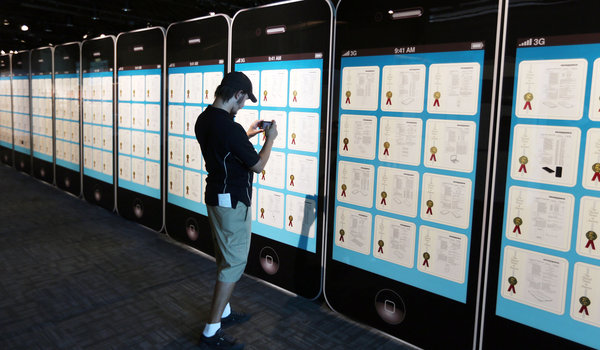Last year, Apple and Google spent more on patents than on R & D of new products.

In the photo: some of Apple's patents protecting innovative technologies of the iPhone (exposure at the Los Angeles County Fair)
Over the past two years, mobile phone manufacturers have spent about $ 20 billion on the purchase of patents and litigation. This is a similar amount to eight Martian missions like Curiosity. In 2011, for the first time in history, Apple and Google spent more on patents than on developing and researching new products.
The NY Times has published a great article about the nightmare that is happening in the field of patent law. The opinions of many experts are published, who call it “chaos”, and the requirements for registering patents are too vague. Many recognize the harm that patents do to innovations, especially software patents.
No one has a solution to the problem. Congress is paralyzed and incapable of reform: there are hundreds of lobbyists activating there who break through diametrically opposed demands. For example, technology companies demand to limit the maximum amount of compensation for violation of an insignificant patent, and pharmaceutical corporations require, on the contrary, to increase the amount of payments for violation of a single patent. In recent years, Congress has been honored for only one reform (America Invents Act), which ultimately only worsened the situation, because it allowed to determine the right holder not by the time the prototype was created, but by the time of application, which again turned out to be in the hands of large corporations that file patent applications in the thousands, and Apple is far from the first place.
')
The NY Times article contains many interesting facts and, for the most part, is about Apple. Since 2006, this company has taken the course to protect its intellectual property and over the past five years participated in 148 patent disputes, more than any other manufacturer of mobile devices (see diagram ).
An abrupt change of strategy occurred several months after Apple in 2006 reluctantly agreed to pay $ 100 million to Taiwanese company Creative for resolving a patent dispute over MP3 players. As it turned out, Creative managed to fill out an application for an abstract “portable music device” a couple of months before Apple launched the iPod. After this symbolic process, Steve Jobs gathered all the top managers and said that in the case of the iPhone they should patent “everything”.
Over the past decade, Apple has increased its patent filings almost tenfold. After 2006, the company organized monthly special brainstorming sessions, where ordinary developers were invited and asked them to express any ideas and just talk about what they are working on right now. Nearby were three patent lawyers and wrote down all the ideas. Then patent applications were filed. Any ideas were drawn up, even those that Apple didn’t intend or didn’t know how to implement - this was done in order to protect against future patent lawsuits, such as Creative lawsuit.
The history of patent number 8,086,604 , which simultaneously demonstrates both the bureaucracy of the US patent office, Apple’s perseverance in the design of its patent arsenal, and the absurdity of the entire patent system, where the one of 7650 experts from the US patent department examines applications. So, for the first time, Apple filed an application for this patent with a description of a universal voice and text search interface for the US patent office in the winter of 2004. Consideration of the 30-page application took the experts 23 hours of working time and two years later they finally rejected it because of the “obvious variation” of existing ideas.
According to statistics, up to 70% of rejected patent applications are subsequently successfully registered after completion. Apple did not give up, changed a few formulations, replaced the word “documents” with “units of information,” added the phrase about “heuristic modules” —and applied again. The patent service rejected it twice in 2007, three times in 2008, once in 2009, twice in 2010 and again in 2011. In the end, after the tenth attempt, after some semantic corrections, the application was nevertheless approved and granted Apple a patent, which is now known as the “Siri patent”, which describes a universal interface for voice and text search. It was on the basis of a violation of this patent in February 2012, the California court banned sales of Samsung Galaxy Nexus smartphones, arguing that a single Google search line in the smartphone interface (Google quick search box with voice-typing requests) violates Apple’s patented technology.
Source: https://habr.com/ru/post/154077/
All Articles